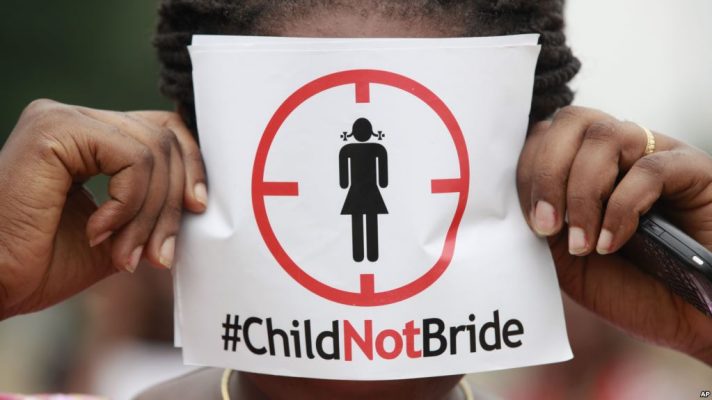
BRIMMING with several other dreadful social indices, Nigeria has been named once more in the top bracket of countries with an extremely high number of child brides, thereby entrenching its odious reputation for misery. Already numbering over 20 million, a new UNICEF report says there will be an additional seven million child brides in Nigeria in the future. This should be a major concern for Africa’s most populous country, where ingrained multiple factors, particularly culture and religion, help to sustain the retrograde practice.
Undoubtedly, the situation is of cataclysmic proportions. Across the land, little girls are intimidated, cajoled and forced into marriage often with much older men. This ruins their lives, renders them vulnerable to disease and destroys their self-esteem. The report, entitled, ‘Situation Analysis of Children in Nigeria: Ensuring Equitable and Sustainable Realisation of Child Rights in Nigeria,’ co-authored by UNICEF and the Federal Government, lays bare this quandary.
Nigeria, with a population of 206.13 million (Worldometer), currently has 22 million child brides. This is 40 per cent of the total population of child brides in two sub-regions of Africa—West and Central Africa. By percentage, Nigeria has the 11th highest child bride population worldwide; Chad (with 67 per cent), Central African Republic (68 per cent), and Niger Republic (76 per cent) occupy the top three positions.
However, there should be no false sense of complacency from the country’s 11th position ranking by percentage; the actual number of victims is rather alarming. Niger Republic (in first position), has only 4.07 million child brides. Conversely, Nigeria (11th position) has 22 million child brides! This is abnormally high. For context, only 17 other countries in the continent have total populations above this figure, according to Worldometer.
It is projected that by 2050, the figure will jump to 29 million. The Nigeria Demographic and Health Survey 2013 said 58.2 per cent of Nigerian girls were married before they attained 18. The North-West, with 32.5 per cent, had the highest proportion of women who married before reaching 15 years, while the South-East recorded the lowest proportion with 4.1 per cent.
This explains why the number is so huge. The main drivers are the refusal to educate the children, culture and religion, and poverty. Constitutional ambiguity has compounded the menace.
At between 10 million and 16.5 million, Nigeria has the highest number of out-of-school children in the world. In May, UNICEF reeled out a new figure of 18.5 million. Of this number, the percentage of the girl-child stands at 60 per cent. These are the main victims of child marriage primarily because they are not in school.
Incidentally, the rate of child marriage lessened for women marrying before 18 from 48 per cent to 43 per cent by 2018, but the UNICEF report warned, “The rate of decline is also not enough to significantly reduce child marriage in Nigeria under current conditions. This is because the statistically observed decline will be upended by population growth and the prevalence of child marriage in some regions and cultures, erasing whatever little progress is made in reducing child marriage.” This is food for thought as the country’s population is growing at 2.53 per cent annually.
Although Nigeria adopted the Child Rights Act in 2003 to ameliorate the condition of children, Adamawa, Borno, Bauchi, Gombe, Kebbi, Yobe, Kano and Zamfara states have not domesticated the law, UNICEF said. Sadly, implementation is lax in the states that have adopted it. Many state governments have neglected their duty to educate the children. In 2017, a former Emir of Kano, Lamido Sanusi, stated that 75 per cent of the girls being given out in marriage in northern Nigeria were illiterates. His admonition that state governments should stop building mosques and invest instead in education, has been ignored by the governors.
Many of the culprits of child marriage hide behind dated cultural and religious practices. These becloud and politicise the issue. A former governor of Zamfara State exploited this to marry an underage girl. Indeed, the odious practice is rampant among the high and low, especially in northern Nigeria.
The consequences are devastating. Not only is the girl-child denied education and normal life but her health is also often critically jeopardised. Consequently, Nigeria has the world’s highest prevalence of vesicovaginal fistula cases, a disease in which a woman leaks urine directly from her bladder to the vagina, says the UNFPA. It can occur when the blood supply to the tissues of the vagina and the bladder is restricted during prolonged obstructed labour, the dead tissues between these organs forming holes through which urine can pass uncontrollably, says the Borgen Project, an American non-profit. It stated that 20,000 Nigerians contract VVF annually. Out of the global figure of two million, Nigeria logs between 400,000 and 800,000 cases.
Unlike Nigeria, where the political and religious elites curiously live in denial of child marriage and its deleterious impacts, UNICEF says six African countries have made great progress in reducing child marriage in the past 15 years. Step in Algeria (6.0 to 3.0 per cent), Tunisia (7.0 to 2.0 per cent), Rwanda (6.1 to 7.0 per cent), Guinea-Bissau (44 to 24 per cent), Zambia (46 to 31 per cent) and Ethiopia (60 to 40 per cent). Nigeria has no excuse to continue to allow child marriage.
To UNICEF, the solution lies partly in law. It wants the Federal Government to enact legislation fixing the legal age of marriage at 18 years. This is sensible. As a federation, states that are willing can abide with the stipulation or even raise it. A sterling example is Lesotho, which has increased the legal age of marriage for women to 21. This is drastic but desirable.
Therefore, religious and political leaders, and the federal and state governments should acknowledge their failure and implement campaigns to save the girl-child from this ugly phenomenon. The CRA should be universally adopted and strictly enforced. States should enact and enforce new legislation imposing stronger penalties for child marriage.
Copyright PUNCH.
All rights reserved. This material, and other digital content on this website, may not be reproduced, published, broadcast, rewritten or redistributed in whole or in part without prior express written permission from PUNCH.
Contact: [email protected]





